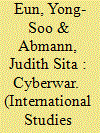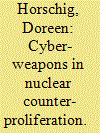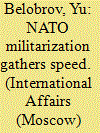| Srl | Item |
| 1 |
ID:
147381


|
|
|
|
|
| Summary/Abstract |
This article examines the implications of cyberwar for national security and traditional warfare. While not making traditional war obsolete, cyber-weapons can nonetheless be force-amplifiers for kinetic attacks in future wars. Not only are cyber-weapons easier to deploy, they can also be activated much more cheaply than conventional weapons. This cost–benefit ratio levels the playing field, especially to the benefit of Third World countries which lack considerable leverage in terms of exercising traditional military power. By bringing new aspects to the theater of war, cyberwar asks us to revamp our policy and study of security, war, and power. Although it does not change the very nature of warfare which remains political, instrumental, and violent, cyberwarfare will reshape the ways in which war begins or is carried out in the near future. Our analytical and theoretical understanding of the international politics of the digital age can be enriched by taking what is happening in cyberspace more seriously.
|
|
|
|
|
|
|
|
|
|
|
|
|
|
|
|
| 2 |
ID:
173168


|
|
|
|
|
| Summary/Abstract |
Under what conditions are cyber-weapons effective in nuclear counter-proliferation? With continued interest in nuclear proliferation professed by Iran, North Korea, and Saudi Arabia, a discussion of the effectiveness of counter-proliferation measures remains relevant. Cyber-attacks as military option in a state-on-state conflict still requires additional corroborating evidence to make conclusions about its long-term effectiveness. This work analyses the general applicability of cyber-weapons and their usefulness in nuclear counter-proliferation. Through a comparative case study of Operation Orchard, Stuxnet, and recent “Left-of-Launch” operations against North Korea, the essay finds that cyber-operations are not particularly effective against nuclear programmes that are in the later stages of their development. They can disrupt and delay a nuclear programme temporarily, if the attack remains clandestine, but cannot halt nuclear proliferation all together. However, effectiveness increases if they are used in combination with conventional weapons. The article addresses a topic of interest to national-level decision-makers: whether cyber-operations can and should play a role in nuclear counter-proliferation.
|
|
|
|
|
|
|
|
|
|
|
|
|
|
|
|
| 3 |
ID:
158171


|
|
|
|
|
| Summary/Abstract |
AS THE MEMBERS of the alliance never tire of saying, the NATO countries are conducting the largest buildup of the bloc's collective military forces since the end of the Cold War. Along with the programmed increase in military expenditures, the expansion of the alliance's military potential, and the rise in the number of forward-based troops along Russia's borders on the territory of the East European countries, the scale of military activity is expanding, and facilities for the stockpiling of weapons, heavy vehicles, and other materiel are being created or brought up to NATO standards.
|
|
|
|
|
|
|
|
|
|
|
|
|
|
|
|